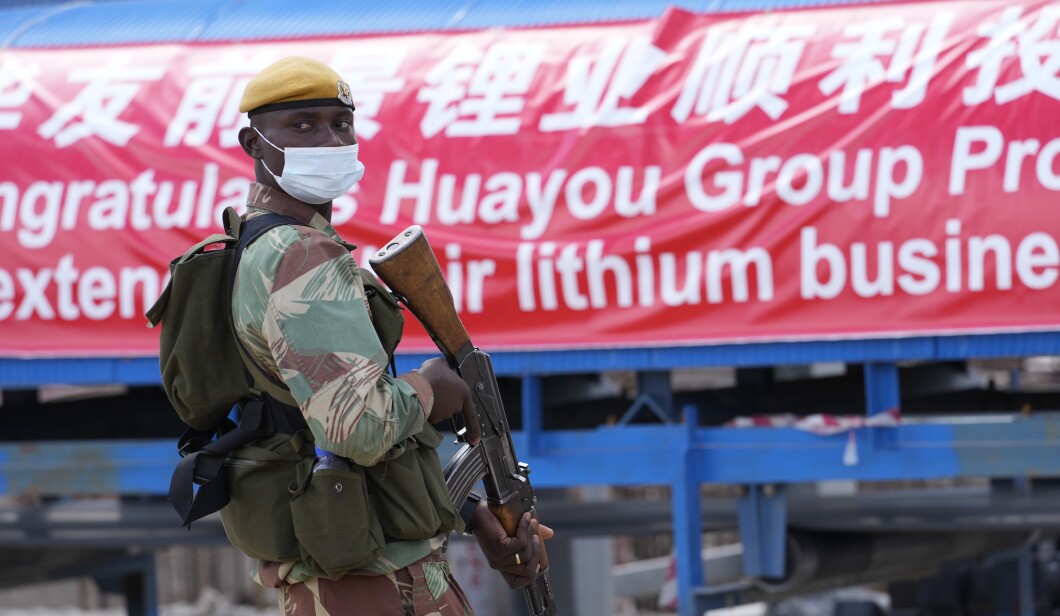
An agreement to invest $300 million in a lithium processing plant in Zimbabwe is paying dividends for China across Africa.
“The narrative about this lithium mine is being reported here in very, very positive terms,” the National Defense University’s Paul Nantulya told the Washington Examiner while traveling in Tanzania. “And this is absolutely critical because China does have some major investments in Tanzania. … From a rhetorical standpoint, yes, China is achieving is achieving objectives.”
JOBLESS CLAIMS NUMBERS ARE SENDING A SURPRISING MESSAGE ABOUT THE ECONOMY
That is not the message U.S. officials hoped would reverberate across the continent months after Vice President Kamala Harris and Secretary of State Antony Blinken combined to visit five African states in two separate trips. Yet the investments in Zimbabwe’s lithium industry point to a shift in China’s economic tactics as it continues to compete with the United States.
“The purpose of that really is to isolate Western narratives, American narratives, which at the moment have really criticized China for exporting raw material and for essentially exploiting the continent,” Nantulya, a research associate at NDU’s Africa Center for Strategic Studies, said. “What China is doing with lithium, and cobalt, and other strategic minerals, is basically trying to pierce that narrative, which is a key political and diplomatic goal.”
In-country mineral processing helps Beijing counter U.S. warnings China’s Belt and Road Initiative amounts to a predatory lending scheme targeting impoverished countries in strategic locations.
“This is Africa’s moment to bolster its position in global supply chains as diversification efforts continue,” United Nations Conference on Trade and Development Secretary-General Rebeca Grynspan said while traveling in Kenya.

Grynspan visited Nairobi for the launch of an annual report on economic development.
“While the need for Africa to integrate global supply chains is not new, we urge African countries to avoid being locked into the provision of ‘just’ raw materials, which results in very low-value integration into global supply chains,” the UNCTAD report advised.
That recommendation could reinforce requirements that mining companies include the host country in a subsequent link of the supply chain. Such mandates could play into China’s hands despite the extra cost because the communist regime can make investments based on political priorities.
“African leaders, broadly, are under a remit to avoid the resource curse,” said William Tobin, assistant director of the Atlantic Council Global Energy Center. “If anybody is going to aid them in doing this … It’s probably going to be the Chinese at this point because the fundamentals for making the investment in those processing plants are just not terribly strong right now, but that might not matter to a lot of Chinese firms.”
Zimbabwe is the world’s sixth-largest producer of lithium. China’s Zhejiang Huayou Cobalt bought the Arcadia lithium mine from an Australian company for $422 million, just one of several deals that reportedly have brought “about $1 billion” of investment from Chinese companies in Zimbabwe’s battery-powering lithium reserves. Those investments have helped to raise expectations that China will control one-third of lithium, also known as “the new gasoline,” by 2025.
“It gives them more leverage over pricing,” Tobin said. “They have more buying power. It makes the global economy global supply chains basically subject to Chinese domestic economic policies.”
Western companies can’t easily compete with such investments, especially in Zimbabwe. In December, for instance, the U.S. put Zimbabwean President Emmerson Mnangagwa’s son on a sanctions list as part of a crackdown on “human rights abusers and those who undermine democratic processes or facilitate corruption.” Yet a corrupt and disreputable environment is no obstacle for China.
“It’s not an economic decision. It’s a political decision. Those are decisions that are taken at the heart of the Communist Party of China, right, which would involve Xi Jinping himself. And if a directive comes from the high echelons of the Chinese Communist Party, … finance will be extended regardless of the economic rationale.”
Similar restrictions are proliferating across the continent, from the Democratic Republic of the Congo to Ghana.
“We intend to end the practice of not adding value to our mineral resources,” Ghanaian natural resources minister Samuel Abu Jinapor said in June. “We are beginning by establishing the appropriate policy and legal framework for Ghana to significantly benefit from the new paradigm of green energy.”
CLICK HERE TO READ MORE FROM THE WASHINGTON EXAMINER
Ghanaian President Nana Akufo-Addo has aligned with the U.S. in some important ways. But a mineral processing law, paired with China’s willingness to expedite investments in key locales, could present Beijing with a valuable opportunity on Africa’s Atlantic coast.
“China is ready and willing to help these African countries to provide the technology that will be necessary for them to export finished goods, but those finished goods are ending up in China,” Nantulya said. “And [Ghana is] a very important country to China, as far as the westward expansion of China’s influence is concerned.”






